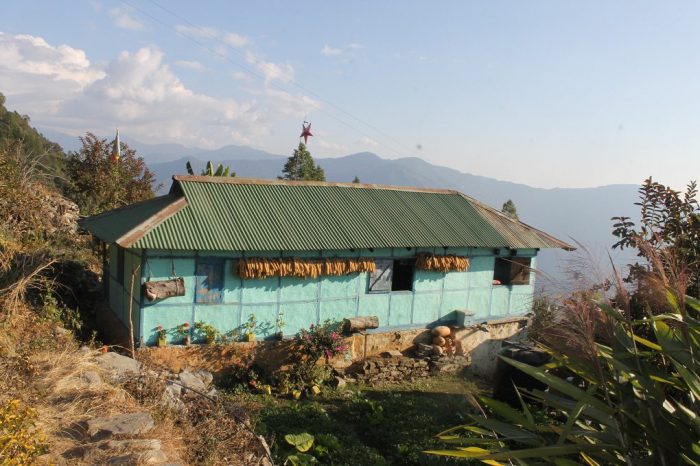
A house of a farmer in Sikkim [image by: Nita Narash]
“The transition to sustainable food and agriculture systems is critical for a sustainable future. Both Sikkim and Bhutan show with their 100% organic goals that such a transition is possible,” said Ibrahim Thiaw, Executive Secretary, UN Convention to Combat Desertification (UNCCD). “We can learn many lessons from their exemplary actions on policy-making.”
The HKH region extends 3,500 km over eight countries, from Afghanistan in the west to Myanmar in the east. It provides water, ecosystem services, and the basis for livelihoods to a population of around 240 million people. Its river basins provide water to as many as 1.9 billion people, a fourth of the world’s population.
Humanity needs to manage land more efficiently to avoid a climate breakdown, a United Nations scientific report warned in August. Growing human pressure is degrading land globally and climate change is adding to these pressures, it said. Some countries, especially in Asia, have pointed out that they are suffering from serious land degradation, which includes west and north-west China and the Bundelkhand, northern Gujarat, Marathwada, Vidarbha and Telangana in India.
Sustainable farming
Fortunately large areas of Bhutan, Nepal and the Indian Himalayas have mostly remained untouched by the disruptive effects of the Green Revolution due to inaccessibility and difficult mountainous terrain. In the past 10 years, policymakers in Bhutan, Nepal and Indian have recognised the need to transition toward sustainable agricultural systems to preserve natural resources and improve livelihoods for rural populations.
“Political commitment has been concretely implemented with varying degrees of intensity, including policies and programmes with specific budget earmarks for measures supporting organic farming and agroecology,” said the report titled The Mainstreaming of Organic Agriculture And Agroecology in the Himalaya Region. The report was prepared by the World Future Council (WFC) and IFOAM Organics International with support from the Schweisfurth Foundation. It was released at the just concluded biennial summit of the UNCCD.
The report showcases existing political support towards organic farming and agroecology across the Himalayan region and provides insights on the current institutional efforts and limitations of mainstreaming sustainable agriculture with a focus on three countries — Bhutan, India and Nepal. “By scaling up organic agriculture and agroecology, it is possible to tackle malnutrition, social injustice, climate change, and loss of biodiversity,” said Alexandra Wandel, Executive Director of WFC.
![Terraced rice fields in the western Himalayas [image by: Hugh Derr]](https://impactnews.in/wp-content/uploads/2019/09/Organic2.jpg)
Terraced rice fields in the western Himalayas [image by: Hugh Derr]
“The Indian state of Sikkim was chosen for the Future Policy Gold Award 2018 because it is the first state in the world to become fully organic. It set an ambitious vision and achieved it, reaching far beyond organic farming production and proving to be truly transformational for the state and its citizens,” said Louise Luttikholt, Executive Director of IFOAM. “Sikkim sets an excellent example of how other Indian states and countries worldwide can successfully upscale agroecology.”
Growing organic movement
Sikkim, Bhutan and other Himalayan areas are part of a growing movement pursuing organic farming and agroecology as an effective pathway for achieving the Sustainable Development Goals (SDGs). “They show that achieving land degradation neutrality is no longer a pipe dream but can become reality,” Wandel said.
Institutional support in these countries has thus far mostly been aimed at supporting organic agriculture as a way to link farmers with international niche markets, the report said. However, in many regions of Asia, institutional effort is increasingly devoted to growing the domestic organic market and transforming smallholder farmers who are organic by default into successful organic producers.
Although Bhutan was the first country in the world to declare its intention to move towards fully organic and agroecological agriculture, Sikkim is widely regarded as the true champion. “Its conducive policy framework for developing organic farming shows how policymakers can design and implement holistic approaches to reverse the prevailing economic logic, which favour food systems that fail to account for the negative externalities they impose on nature and taxpayers,” the report said.
The report pointed out that institutional interventions allow for better access to organic inputs, especially organic fertilisers, the creation of governmental units dedicated to organic farming and support for specific research, training and extension service programmes. These interventions also allow for increased support for reaching local and international markets through subsidies for certification, it said.
This article was first published by indiaclimatedialogue.net.
By Soumya Sarkar
This article was also published in The Third Pole. To read the original article click here :
https://www.thethirdpole.net/en/2019/09/17/dealing-with-land-degradation-through-organic-farming/


















